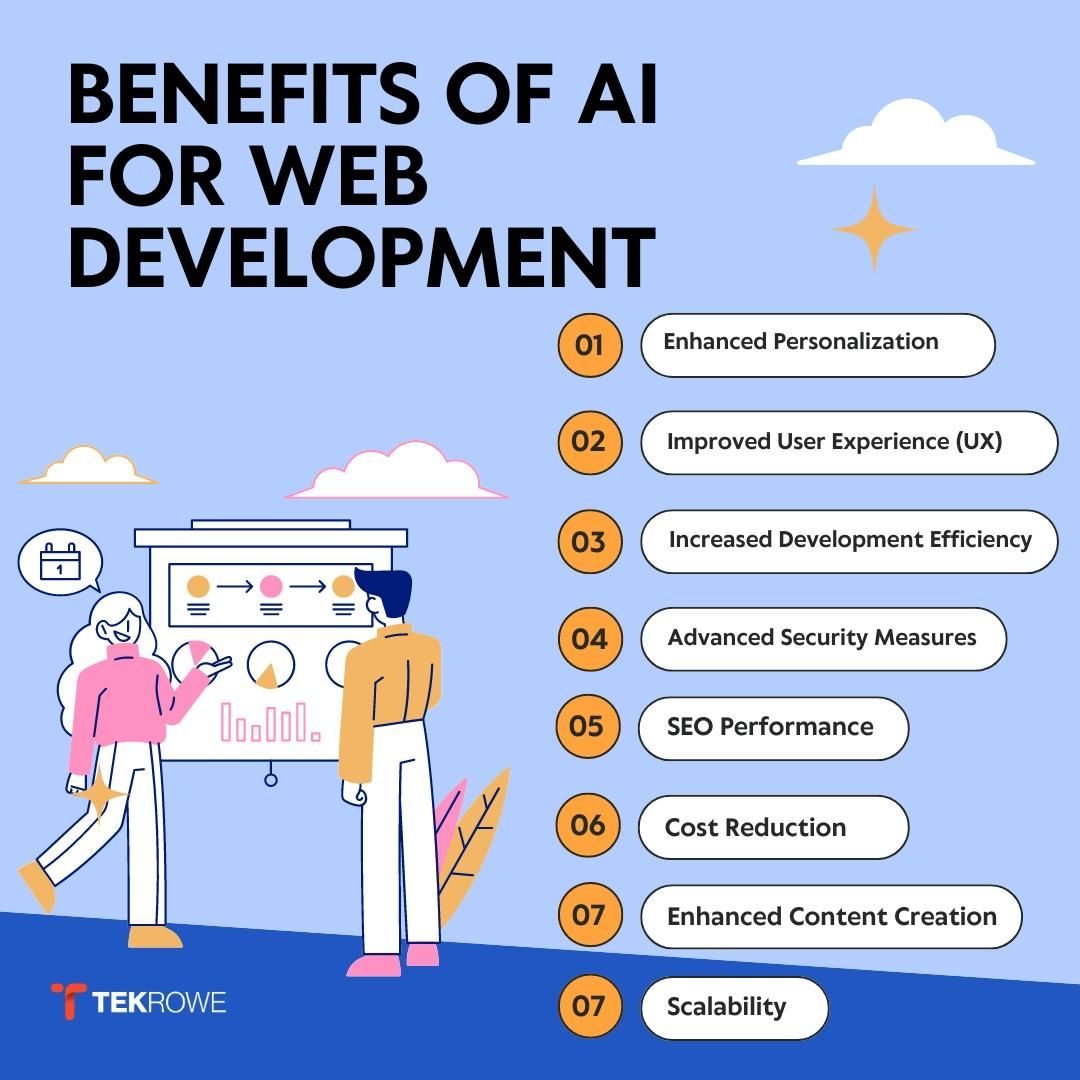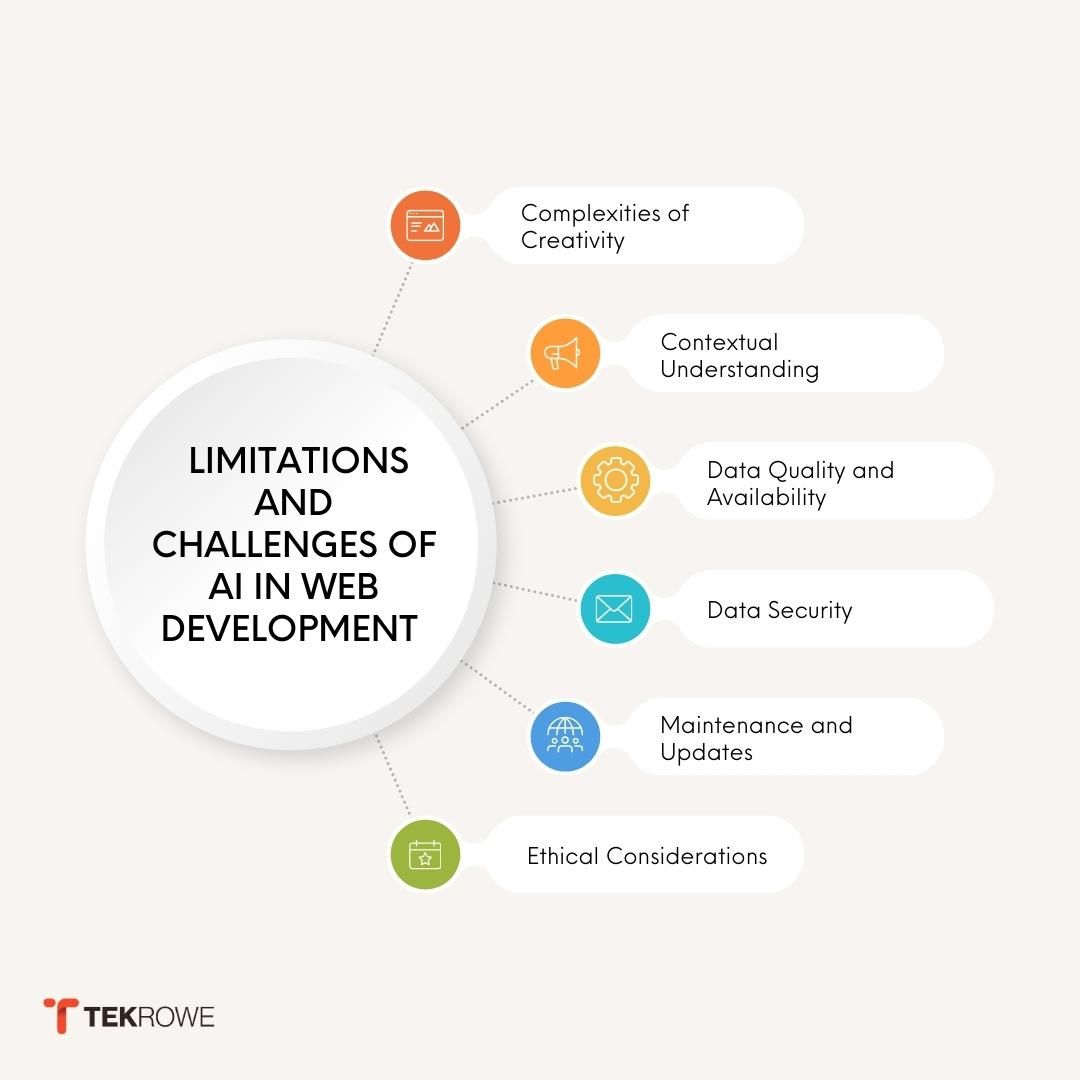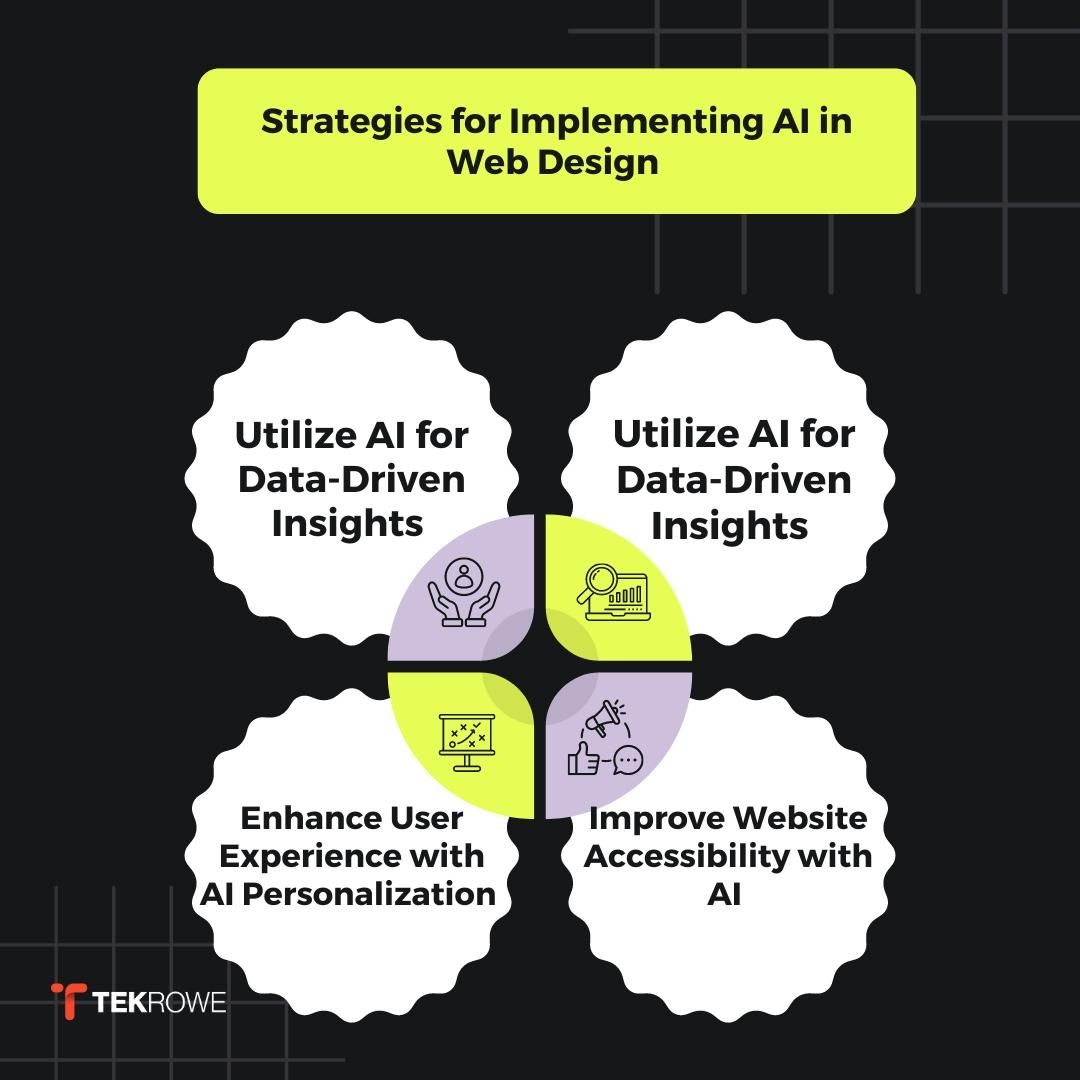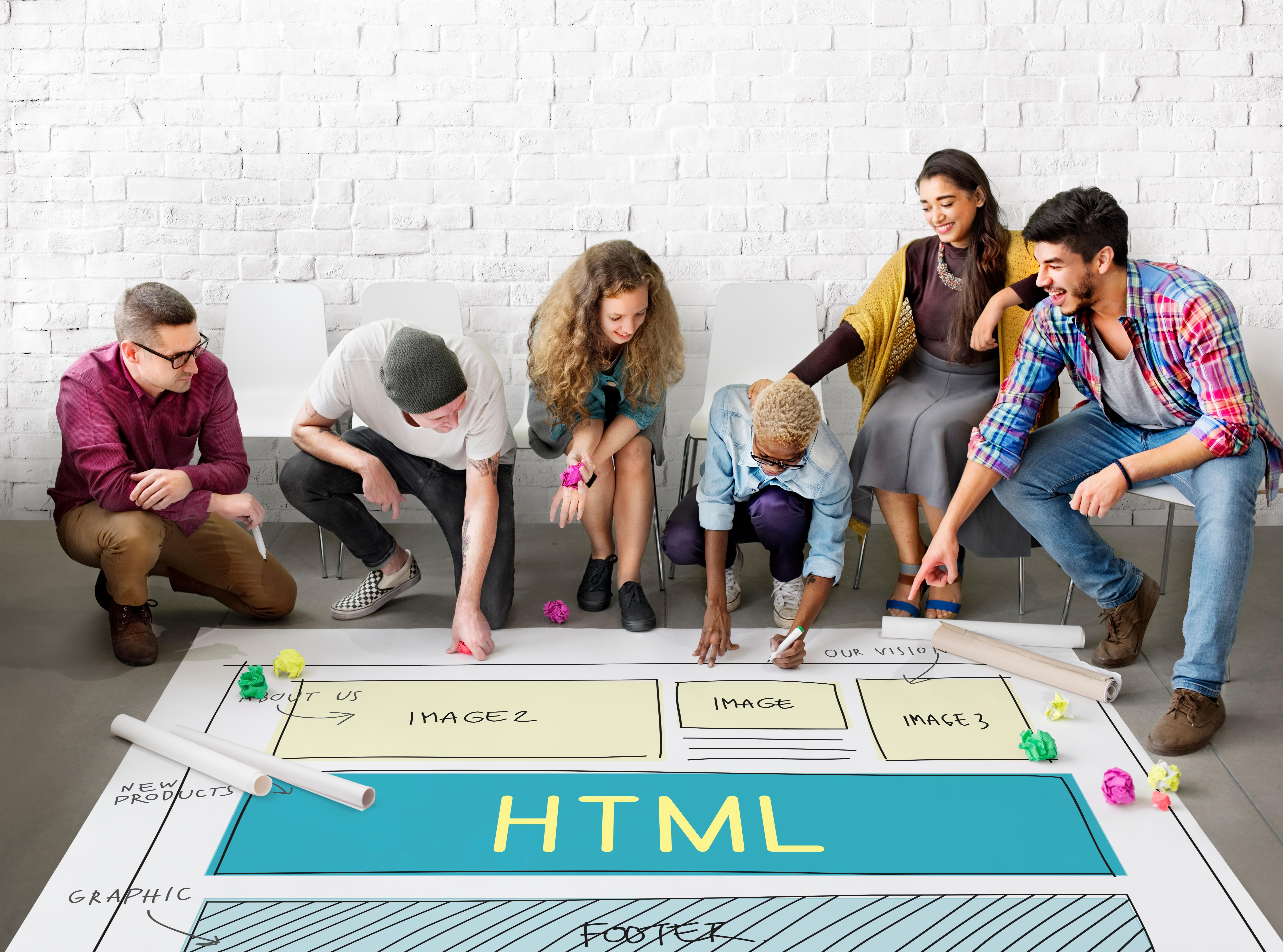The Future of Web Development: Exploring AI's Advantages and Challenges in 2024
Have you ever thought about how Artificial Intelligence (AI) is changing web development? We're here to show you how AI is transforming website design and reshaping the development landscape. AI can make websites more intuitive, adaptive, and engaging.
In a recent survey, 58% of designers said they use AI for creating website imagery and media assets. Moreover, 50% use AI to design entire web pages, while 49% experiment with new design strategies and elements through AI. Additionally, 43% use AI to find ways to improve their designs.
As AI technology advances, it's becoming easier for developers to incorporate AI features into their projects. In this guide, we'll explore how AI in web development can be used, discussing both the challenges and opportunities it presents. We'll offer tips on how to harness its potential in your projects and help you stay ahead with the latest technologies.
What Is AI in Web Development and How Does It Work?
You might have heard of AI (Artificial Intelligence) and machine learning, but you may not know how they can be applied in web development. AI in web development involves using artificial intelligence to create more interactive and engaging websites.
With predictions of the AI sector expanding to a $126 billion market by 2025, businesses are also recognizing the need to embrace artificial intelligence in web development. This technology enables websites to better understand potential customers and tailor their experiences, making them more personalized and rewarding.
So, How Does AI in Web Development Function?
AI uses machine learning algorithms to monitor user behavior on your website, gaining insights into the types of visitors that frequent your page. These algorithms learn from user activity, continuously improving your website's performance by optimizing content. In addition, for better engagement, personalizing offers, and suggesting products or services.
Benefits of AI for Web Development
AI is revolutionizing website design with the ability to learn, adapt, and understand what audiences are looking for in a website. Utilizing Artificial Intelligence in web applications provides a variety of benefits that can help make your website more effective. Artificial Intelligence (AI) is transforming various industries, and web development is no exception. Here are some key benefits that AI brings to the table, making it a vital tool for modern web developers and businesses alike: Additionally, AI can perform predictive analysis, allowing you to anticipate a customer's needs even before they visit your site.

1. Enhanced Personalization
AI enables a high level of personalization that was previously unattainable. By analyzing user data, AI can tailor content, product recommendations, and even user interfaces to individual preferences. This not only improves user satisfaction but also increases engagement and conversion rates. For example, streaming services like Netflix use AI to recommend shows and movies based on a user's viewing history and preferences, creating a more personalized experience.
2. Improved User Experience (UX)
AI-powered tools like chatbots and virtual assistants provide users with immediate support and answers to their questions. This reduces the wait time and enhances the overall user experience. AI can also analyze user behavior to identify pain points and optimize website design accordingly. Companies like Spotify use AI to analyze user interactions and continuously improve their user interface for a smoother and more intuitive experience.
3. Increased Development Efficiency
AI can automate repetitive tasks, allowing developers to focus on more complex and creative aspects of web development. For instance, AI-driven code generators can write boilerplate code, reducing the time required for development. Tools like GitHub Copilot assist developers by suggesting code snippets and functions, significantly speeding up the coding process and reducing errors.
4. Advanced Security Measures
Cybersecurity is a major concern for any web developer. AI enhances security by detecting and responding to threats in real-time. Machine learning algorithms can identify unusual patterns and potential vulnerabilities, providing a proactive approach to security. AI-driven security platforms, such as Darktrace, monitor network traffic and detect anomalies that could indicate a cyberattack, offering robust protection against threats.
5. Optimized Search Engine Performance (SEO)
AI tools can analyze search engine algorithms and user behavior to optimize website content for better search engine rankings. These tools can suggest keywords, content length, and structure, helping websites achieve higher visibility. For example, platforms like Clearscope and MarketMuse use AI to provide data-driven SEO recommendations, ensuring content is both relevant and optimized for search engines.
6. Better Decision-Making with Data Insights
AI can process vast amounts of data quickly and provide actionable insights. This capability helps businesses make informed decisions about their web strategies. Whether it's understanding user behavior, predicting future trends, or optimizing marketing campaigns, AI provides valuable insights that drive better decision-making. Companies like Google Analytics use AI to offer detailed insights and predictive analytics, helping businesses fine-tune their online strategies.
7. Cost Reduction
By automating routine tasks and enhancing efficiency, artificial intelligence in web applications can significantly reduce the cost of development. This is particularly beneficial for small businesses and startups that may not have extensive resources. Automation tools and AI-driven platforms can handle various aspects of development, maintenance, and optimization, allowing businesses to achieve more with less investment.
8. Enhanced Content Creation
AI-powered tools can assist in creating content that is engaging and relevant to users. From generating blog post ideas to writing product descriptions, AI can help streamline the content creation process. For example, artificial intelligence in web applications tools like Copy.ai and Jarvis use AI to generate high-quality content quickly, helping businesses maintain a steady flow of fresh and relevant content on their websites.
9. Scalability
AI enables websites to scale effortlessly to accommodate increasing traffic and user demands. AI-driven solutions can optimize performance and ensure that websites remain responsive and fast, even during peak times. This scalability is crucial for businesses experiencing rapid growth or seasonal spikes in traffic. By leveraging these benefits, businesses can stay competitive in an ever-evolving digital landscape. AI not only enhances the capabilities of web developers but also creates a more engaging and secure online experience for users.
Examples of AI Used in Web Design
In web development, AI enhances user experience and streamlines processes. Here are some ways AI is being used in modern website design:
Automated Design Features
AI can automate certain design tasks, like creating logos and banners. Using the information provided by the user, AI generates images that meet specific needs, saving time and reducing the costs associated with manual design work.
Adaptive Designs
AI helps create adaptive designs that adjust to user preferences. For instance, a website can automatically alter its layout based on the device or screen size, ensuring an optimal experience for every user.
AI-Powered Content Optimization
AI also plays a crucial role in content optimization. AI-powered tools analyze user data and suggest changes based on past behaviors to enhance website performance and boost customer engagement.
Limitations and Challenges of AI in Web Development
While AI brings numerous benefits to web development, it’s important to acknowledge its limitations and the challenges it presents. Understanding these factors helps us navigate the integration of AI effectively.
Here are some limitations and challenges of AI in web development:

Complexities of Creativity
Developing intricate and customized websites that require a touch of human creativity and intuition can be a tough nut to crack for AI. It’s one thing for AI to generate code and automate tasks, but when it comes to those unique, out-of-the-box ideas, human web developers still reign supreme.
AI might struggle to understand the nuances and deliver that special spark of creativity. For example, imagine you want a website with a stunning, artistic design that reflects the soul of your brand. AI might fall short of capturing that essence and creating something truly unique and captivating. That’s where human web developers come in, infusing their creativity and intuition to make it happen.
Contextual Understanding
AI is great at analyzing patterns, but it can miss the bigger picture. Web development involves understanding the context, such as the target audience, industry requirements, and brand identity. AI might not grasp these contextual factors as effectively as human developers, leading to less-than-optimal results.
Data Quality and Availability
High-quality data is crucial for effective AI algorithms and analytics. Without good data, AI won't deliver the desired results. However, many organizations face difficulties in collecting data and making it accessible to the right people promptly.
Data Security
AI relies on sensitive data, raising security concerns for organizations. Implementing robust cybersecurity measures is essential to protect this data from theft and misuse.
Maintenance and Updates
AI algorithms need regular maintenance and updates to stay effective. Neglecting maintenance can lead to errors and inaccurate results. Additionally, AI models must be continuously evaluated and updated with new datasets and changes in customer behavior over time.
Ethical Considerations
AI algorithms heavily rely on data for learning and decision-making. But what if the data itself is biased or incomplete? Well, AI can unintentionally inherit those biases and make inaccurate judgments. This can have implications for things like content recommendations or user profiling. It’s essential to be mindful of the data we feed into AI systems and regularly evaluate their outputs to ensure fairness and accuracy.
Continuous Learning and Adaptation
AI can learn from data and user interactions, but it needs constant training and updates to stay on top of its game. Web developers need to invest time and effort in keeping AI systems up to date, so they can adapt to changing user needs and the latest technologies.
Solving Complex Problems
AI is fantastic at crunching numbers and handling repetitive tasks, but it might stumble when faced with complex problems that require critical thinking and problem-solving skills. Human web developers bring a wealth of knowledge and expertise to the table. They can navigate through tricky challenges, think outside the box, and come up with innovative solutions.
Let’s say you encounter a web development problem where you need to optimize the website’s performance while maintaining its intricate functionality. This requires a deep understanding of both technical aspects and user experience.
While AI can assist in certain aspects, it’s the human web developer who can analyze the problem, devise a comprehensive strategy, and implement the necessary tweaks to deliver an exceptional user experience.
Need Help with Your Business
Contact Us NowThe Future of AI and Web Development
Thanks to rapid advances in AI technology, the possibilities in web development are almost limitless. According to a survey by Gartner conducted before 2023, a whopping 80% of executives believed that automation could be applied to any business decision.
This statistic underscores the potential of automation across various industries, and with the introduction of ChatGPT, we can confidently assert that automation can now be integrated into nearly every business process. Specifically focusing on web development, we are just scratching the surface of automation. Many companies are dedicating their efforts to this area.
With AI, web designers can create websites that are more visually engaging, informative, and personalized to individual user preferences. AI is making web development faster and more efficient. For instance, AI can generate design elements based on user surveys and online trends, saving designers time and effort in creating unique visuals.
AI also plays a significant role in personalizing content for each user's experience. By analyzing visitor data, developers can tailor websites to meet each visitor's specific needs. Moreover, AI is useful for website testing. Automated visual regression testing, for example, uses AI algorithms to detect visual changes in websites over time, allowing for quicker bug fixing and optimization with minimal manual effort from developers.
These advancements in artificial intelligence have enabled web designers to create better websites with less hassle. As technology continues to improve, the use of AI in web design is expected to grow, opening up even more possibilities for what we can achieve.
Strategies for Implementing AI in Web Design
Incorporating AI in web design is rapidly becoming a key strategy for enhancing functionality, efficiency, and user experience. As we advance in the digital era, AI not only streamlines processes but also significantly improves user interactions with websites. Here are several strategies for implementing AI in web design:

- Utilize AI for Data-Driven Insights: AI can revolutionize how you interpret and use data in web design. By analyzing user interactions, AI algorithms can identify patterns and preferences, providing invaluable insights. This data can be used to tailor user experiences, making website interactions more engaging and personalized. AI's ability to rapidly process vast amounts of data outperforms traditional analytics, leading to more nuanced and effective decision-making in design and content strategy.
- Streamline Design Processes with AI Automation: One of the most significant benefits of AI in web design is its ability to automate complex tasks. AI can generate custom images, text, and even sound tailored to individual user preferences, automating aspects of the design process that would traditionally require extensive manual effort. This automation saves time and ensures consistency in design across different parts of the website.
- Enhance User Experience with AI Personalization: AI technologies can greatly enhance user experience by providing personalized content and recommendations. AI-powered chatbots offer instant, accurate responses to user inquiries, streamlining customer service. Predictive analytics tools enable websites to proactively suggest relevant content or products. That based on individual user behaviors, enhancing user satisfaction and potentially increasing sales conversions.
- Improve Website Accessibility with AI: AI also plays a crucial role in making websites more accessible to users with disabilities. AI-driven tools can automatically adjust the website’s layout, contrast, and navigation to suit the needs of various users, ensuring a more inclusive digital experience.
- AI-Driven A/B Testing for Optimized Design Choices: AI-powered A/B testing allows for more efficient testing of different design elements. In addition, AI can analyze user responses to various design options in real-time, helping web designers. As AI technology continues to evolve, its role in web design is set to become even more integral, offering exciting opportunities for innovation and creativity in the digital space.
Conclusion
AI is undeniably revolutionizing web development, bringing about unprecedented changes in personalization, efficiency, security, and user experience. As AI technology continues to evolve, its impact on web development is expected to grow even more profound. However, it is essential to navigate the challenges and ethical considerations that come with it. In the coming years, we can expect AI to become even more integrated into web development processes, offering new tools and capabilities that will further transform the industry.
Business owners, marketing professionals, and developers must stay informed and adapt to these changes to leverage the full potential of AI. By embracing AI, the web development industry can look forward to a future of innovation, efficiency, and enhanced user experiences. As we move forward, it is crucial to balance the benefits of AI with mindful consideration of its challenges and ethical implications.
